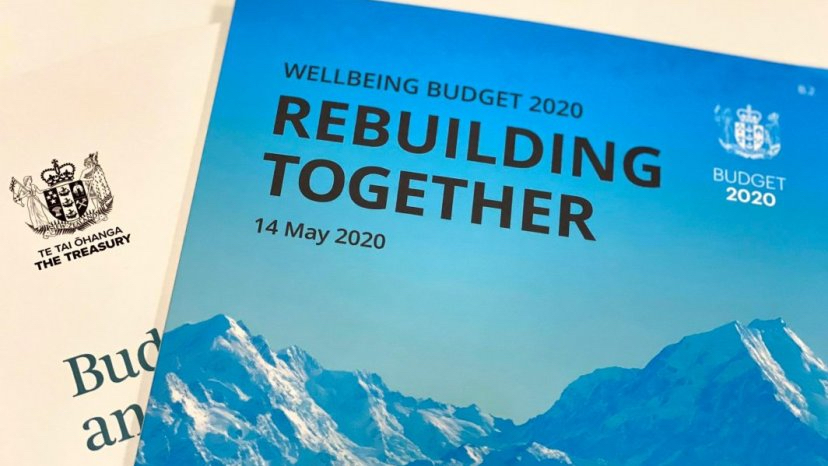Several of Aotearoa’s rainbow organisations have spoken out about the lack of specific funding allocated to rainbow communities in the 2020 Rebuilding Together Budget.
Representing a large body of advocates for the queer, gender diverse, takatāpui & (VSC)/intersex communities*, the Youth Sector Rainbow Collective comprises several organisations including RainbowYOUTH, InsideOUT Kōaro, Waikato Queer Youth, OUTLine, New Zealand Aids Foundation, Dunedin Pride, Intersex Youth Aotearoa (ITANZ), Q Youth & Qtopia.
The 2020 Rebuilding Together Budget includes an $183m increase in funding for family violence services and a further $115m for social services and community groups, which we were thrilled to see. We’d like to see rainbow communities specifically named in this section as a priority group, as there is no assurance that the needs of rainbow young people will be specifically considered without this. Our organisations consistently work with young people who experience family & intimate partner violence; an issue that affects rainbow communities at a disproportionate rate. Recent research shows us that rainbow communities – particularly transgender & non binary people – are more likely to face family violence and rejection, which we have seen increase during the COVID-19 pandemic.
District Health Boards were allocated a $3.9b funding boost along with $282.5m to catch up on delayed care such as specialist appointments and surgeries. We’d like to see a targeted approach towards prioritising gender affirming healthcare for transgender & non binary people in need of gender affirming surgeries, as the access to these procedures is already limited or uncertain, and is likely to worsen as resources are reprioritised to the COVID-19 response. It is crucial to ensure ongoing service delivery that meets the needs of VSC/intersex young people and improves access to affirming and aware specialist health care. VSC/intersex people are underrepresented in all national data collection; research shows us that 3% of the participants in the Counting Ourselvse Study identified as VSC/intersex, with 21% questioning if they may have a VSC intersex condition. For a lot of the communities that our organisations support, people live in fear that their access to medical care will become more limited due to the pandemic. Our communities are afraid that they won’t be able to continue their hormone treatment either due to a lack of supply, or not being able to access their GP. As organisations who work on the ground to support young people access gender affirming healthcare, we know that there is an unmet need for people who want gender affirming surgery but are not able to access this. Research shows us that 67% of transgender men and 49% of transgender women have an umet need for gender affirming surgeries, with affordability being the most common barrier to accessing this.
$20 billion – almost 80% of the Rebuilding Together Budget, has been set aside for the ongoing response to COVID-19. There are many ways that rainbow young people are affected by the COVID-19 pandemic and its resulting restrictions – particularly in regards to mental health & wellbeing. We would like to see a portion of this funding allocated towards national initiatives that enable mental health & addiction support services to be accessible and appropriate for rainbow young people. Even at the best of times, rainbow young people face higher rates of mental distress than their peers. We know that 71% of transgender & non binary people experience high or very high psychological distress; compared with only 8% of the general population. This is more prevalent for people with intersecting identities – for example; takatāpui might experience distress related to being Māori and the discrimination that brings, alongside their sexuality, variation of sex characterisitics or gender. In order to combat this, we need to work towards creating a more sustainable & supportive mental health system.
Lastly, we would like to see a strong commitment from our government towards reducing rates of homelessness – particularly for queer, takatāpui, VSC/intersex & gender diverse people. Although the proposed 8,000 new public & transitional homes will provide solace for a lot of vulnerable people, currently there are 16,309 people on the waitlist for social housing. Recent research shows us that almost one in five trangender & non binary people in New Zealand have experienced homelessness in their lifetime. People who are kicked out of their family home due to their gender often struggle to find housing options that are safe and welcoming. Moreover, discrimination from employers, housing providers, and the wider public contributes to a cycle of homelessness for transgender & non binary people. We would like to see stronger initiatives to ensure that queer, takatāpui, VSC/intersex & gender diverse people have access to housing that is safe and accessible.
Now more than ever, rainbow communities are facing significant challenges relating to employment, housing, family violence, and mental health. The COVID-19 pandemic and its resulting restrictions are changing the way that we live and work, and we suspect that this will get increasingly challenging over the next few months. We are calling on the government to name rainbow communities in the Rebuilding Together Budget.
Intersex Youth Aotearoa (ITANZ)
*VSC: variation of sex characteristics.

